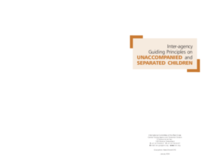Children separated from their parents and families because of conflict, population displacement or natural disasters are among the most vulnerable. Separated from those closest to them, these children have lost the care and protection of their families in the turmoil, just when they most need them. They face abuse and exploitation, and even their very survival may be threatened. They may assume adult responsibilities, such as protecting and caring for younger sisters and brothers. Children and adolescents who have lost all that is familiar – home, family, friends, stability – are potent symbols of the dramatic impact of humanitarian crises on individual lives.
The breakdown of social structures and services accompanying major crises means that communities and States themselves may not be in a position to provide the necessary protection and care for children without families. It is therefore imperative that humanitarian organizations ensure that the most vulnerable children are protected. The range and complexity of situations in which children become separated from their families, and the diverse needs of the children themselves, means that no single organization can hope to solve the problem alone.
It is against this backdrop that the Inter-agency Working Group on Unaccompanied and Separated Children was set up in 1995. It brought together key organizations with field experience of issues concerning separated children. The objectives of the group are to promote and support preparedness, coordination and good practice based on lessons learnt.
The survival of unaccompanied and separated children may be threatened in armed conflict or other disasters. These children are most likely to have their basic rights violated and to risk abuse, exploitation or recruitment into armed forces.
All children are entitled to protection and care under a broad range of international, regional and national instruments. Of particular relevance for separated children are:
- the right to a name, legal identity and birth registration;
- the right to physical and legal protection;
- the right not to be separated from their parents;
- the right to provisions for their basic subsistence;
- the right to care and assistance appropriate to their age and developmental needs;
- the right to participate in decisions about their future.
Primary responsibility for ensuring children’s survival and well-being lies with parents, family and community. The national and local authorities are responsible for ensuring that children’s rights are respected. Efforts must be made in an emergency to protect family unity and avoid child-family separation.
The principle of family unity – or integrity of the family – states that all children have a right to a family, and families have a right to care for their children. Unaccompanied and separated children must be provided with services aimed at reuniting them with their parents or primary legal or customary caregivers as quickly as possible. If large numbers of children are separated from their parents or other relatives in an emergency, priority should be given to the most vulnerable, whether accompanied or unaccompanied, taking into account that the latter are likely to be more vulnerable.
Where family unity can not be preserved, these guidelines provide instruction on tracing and family reunification, care arrangements, durable arrangements, special issues related to refugee children, and promotion of children’s rights.

